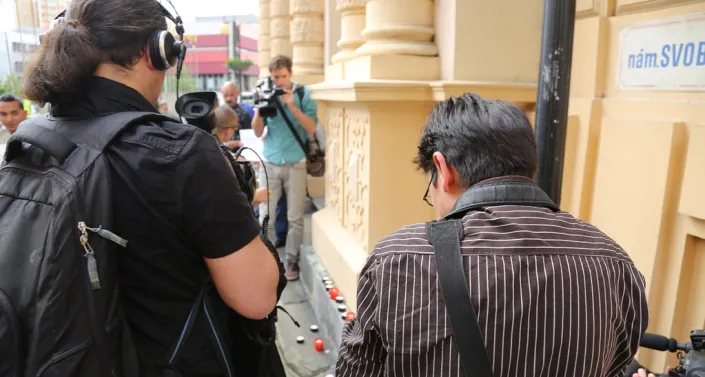
Czech Republic
The Czech Republic is a parliamentary democracy in which political rights and civil liberties are generally respected. Czech Republic ranks 20th in the RSF Press Freedom Index. Freedom of expression is explicitly recognised in the law, the restrictions upon this right are clearly defined, and legal response in case of violation of this right are mostly effective.
In recent years, the country has experienced a number of corruption scandals and political disputes that have hampered normal legislative activity. Illiberal rhetoric and the influence of powerful business entities in the political arena are increasingly visible.
Restrictive media landscape
The media market is characterised, among other features, by an overall dominance of television, attracting about half of the total advertising expenditures in the country. The media outlets in the Czech Republic are split into two categories: the public service media which is paid for by taxpayers, and the privately-owned media. There are three public service media organisations: the Czech Television, the Czech Radio and the Czech Press Agency. In comparison to other V4 (Czech Republic, Hungary, Poland, and Slovakia) countries, the Czech public service media maintain a high quality standard and trust of the public.
This has also sparked attacks by the populist political forces and repeated attempts to limit the independence of Czech public service media. This situation remains the number one threat to the democratic media landscape in the country. The daily print market is highly concentrated, with only four nationwide newspapers, a few quality magazines, two major tabloids and a network of regional newspapers: Deník. Online news consumption is becoming ever more important, with the internet (including social media) being the most used platform for accessing news among internet users.
There is concern and discussion about the concentration of media ownership in the hands of a few oligarchs and their motivations, including the former prime minister who bought the two most influential media in 2013. Despite the situation for traditional media outlets, there is a growing number of diverse and vibrant independent smaller media outlets that do important award-winning investigative work and foreign reporting.
Safety
Although there are no limits on speech when criticizing the government, public officials or state symbols, Czech journalists are pressured and threatened online and offline. They are also challenged by the so-called “alternative” media that are used as tools to advance the political and business interests of politicians, channels of Russian and Chinese propaganda, and as a clickbait disinformation business opportunity. Both the president and the prime minister are inspiring other officials when they attack journalists in an effort to discredit them as individuals, and encourage widespread mistrust about the profession.
During the COVID-19 pandemic and related protests, journalists were often victims of threats, attacks and stalking.
Free Press Unlimited’s work in Czech Republic
For the local journalists in Central Europe, Free Press Unlimited provides training and support in the field of medical journalism and countering disinformation. Additionally we provide courses about cross-border journalism, sharing with them Free Press Unlimited’s experience in creating and producing cross border journalistic stories content as well as distribution of this content across the cross-border audience. To develop their skills, Free Press Unlimited also provides mentoring and other types of assistance in content production.
Photo: Daniela Kantorova.

